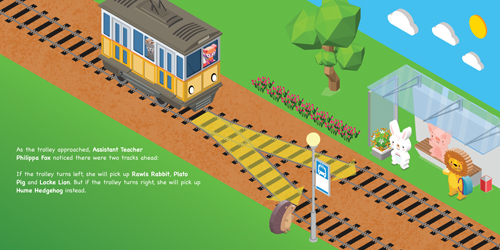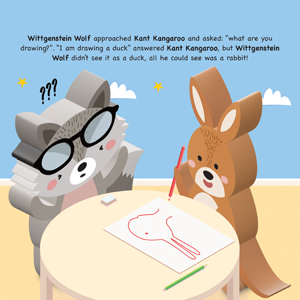
Your complimentary articles
You’ve read one of your four complimentary articles for this month.
You can read four articles free per month. To have complete access to the thousands of philosophy articles on this site, please
Books
Philosophy Friends! by Francisco Mejia Uribe
Max Rocky Zelcer and Mark Zelcer review five short childrens’ books starring their Philosophy Friends!
Hi, I’m Max. I am seven years old and I am in second grade. Me and my dad Mark (who I call ‘Tatty’) are going to tell you about five books we read about Philosophy Friends! My dad helped me write this book report because usually we just talk about things and don’t write things down. Tatty’s comments are in italics.
The Philosophy Friends! books are all about philosophy, and they are all amazing. The friends are all animals with philosophy names, and they all talk about philosophy questions.
The first book, Philosophy Friends! Philippa Fox and the Trolley Problem, is about a trolley that can go right or left. If it goes one way it will pick up three friends and if it goes the other way it will pick up just one. If it picks up three friends, then the other one will have to find another way to get to the library. If it picks up one, then the three friends have no ride to the library. Socrates Goat said that we have to make as many people happy as we can, so the trolley picked up the three friends. Philippa Fox and Rawls Rabbit were sad because they wanted to pick up their one friend instead of the other three. But they listened to Socrates Goat. It turned out OK because the bus instead of the trolley picked up their friend.
This is my favorite Philosophy Friends! book. I like the pictures in it the best, especially the one with Rawls Rabbit being sad. But my dad says that he thinks it is the weakest of the lot. I don’t know what that means, but I thought it was a good idea for the trolley to always pick up three friends instead of just picking up one. Socrates Goat said that too. My dad thought that it was strange seeing Socrates lecturing in favor of utilitarianism. Also, the story misses the point of Philippa Foot’s original ‘Trolley Problem’. Her point was to show that there can be competing intuitions about maximizing utility versus one’s duty not to harm others. The story just ends up being a lesson in the virtue of maximising utility. But I agree with the book. You should always pick up three friends and let one friend take the bus because it is better to help three friends rather than just one. The one friend could just find another way to get to the library, even if his mom was counting on the trolley so she would not have to drive him.

Images © Francisco Mejia Uribe. Please visit philosophyfriends.com
The second book, Philosophy Friends! Rawls Rabbit and the Fair Race, is about friends who always race. But one friend, Rawls Rabbit, is much faster than the others. Then Richard Hare comes along, and he is even faster than Rawls Rabbit! Richard Hare always wins. So Rawls Rabbit invents a fair race, letting some friends start ahead of the others so all the friends can win when they finish together.
My dad thought Rawls Rabbit came off as a bit self-serving. He is just old and cynical (I don’t know what that is either, but I hope it doesn’t happen to me when I get old). Rawls Rabbit was fine with the system until he wasn’t winning. Then he set up a system that was ‘fair’ so that everyone won, including him. But that seems to miss the point of a race. If they just wanted to run, why race? If they want to compete, there must be a winner. Nonetheless, just as the philosopher John Rawls did, the book shifts our focus from winning as ‘coming in first’, to winning as ‘being happy we all finished together’. My friends don’t compete too much, but I think some of them would want races to be fair and some would not. I will ask them when I go back to school.
The third book, Philosophy Friends! Mill Mouse visits the Statue of Liberty, is about the meaning of ‘freedom’. The friends talk about freedom on their way to visit the Statue of Liberty (which means Freedom) in New York. I live in New York too! Socrates Goat says that freedom is about doing what you want to do while making sure other people don’t get hurt.
My dad liked this book more than I did, even though he wishes it focused on Mill’s famous arguments for liberty rather than on the fact that Mill qualifies these arguments by saying that it’s justified to regulate freedom when it comes to preventing harm to others.
The fourth book, Philosophy Friends! Plato Pig Finds a Ring, is about a pig who finds a ring that turns him invisible. When he is invisible, he has a chance to take all the other friends’ snacks and no one will know. But he doesn’t take them because he knows it is better to share.
Me and my dad don’t agree about this book. I already know that I should share because it is a good thing. My dad says that this is exactly the opposite of Plato’s point in his story about the Ring of Gyges in the Republic , which says instead that people would take everyone’s snacks if no one could see them. But taking other peoples’ snacks is wrong, so I am glad that Plato Pig did not steal.

The fifth book, Philosophy Friends! Wittgenstein Wolf Asks What Do You Mean?, is about what is similar about different games, and also about something called ‘family resemblances’. Wittgenstein Wolf didn’t know what chess was, but Locke Lion told him it was a game, just like ‘go’ is a game. Then they taught him the rules. This is a good message : that it is good to teach people things yo u know. Wittgenstein Wolf also saw Kant Kangaroo drawing a rabbit, but he thought it was a duck. Then Socrates Goat told them that it was both a duck and a rabbit. We have to look at things from everyone’s perspective, so we can all win!
Socrates Goat explained that looking at a duck that was also a rabbit was the same as looking at a 6 that was also a 9. My dad was not so sure. But he did think that it was a good philosophy question. The image on the page doesn’t change. If you look at a ‘6’ upside down, it may look like a ‘9’, but it should still refer to 6. You just might not get it because it’s upside down. Maybe that means that symbols do not refer to objects, especially abstract objects, the way we think they should.
I liked all the books. They are cool. They have cool characters. They teach you about interesting philosophy questions that are good for your brain. That’s what I like most about them. The questions are very important in philosophy. The pictures are cool too. They would be good for kids and adults to read if they want to learn about philosophy questions. They are great books for starting conversations about whether sharing is good, what freedom means, what is fair, and things like that. But they should read them during the day and not at night before you go to sleep so they don’t stay awake thinking about philosophy questions. Bedtime is for relaxing.

At the end of each book is a page that tells you about who the philosophy friend is in real life. Philippa Fox, for example, is a real person named Philippa Foot. It was good to learn that. It is also good that you can buy the books in Spanish too. But I can’t read Spanish yet.
I think the writer should make a philosophy book for kids about paradoxes. I love making up paradoxes. Here is one I thought of myself: Sometimes I say it is Opposite Day, where everything I say that day is the opposite of what I say it is. But if I say it is Opposite Day, then it means it is not Opposite Day, so it is Opposite Day…
I think kids would love these philosophy books; and adults too.
© Max & Mark Zelcer 2021
Mark Zelcer is Assistant Professor of Philosophy at Queensborough Community College, of the City University of New York. Max Zelcer attends the Hannah Senesh Community Day School in Brooklyn.
• Philosophy Friends! Plato Pig Finds a Ring; Philosophy Friends! Philippa Fox and the Trolley Problem; Philosophy Friends! Rawls Rabbit and the Fair Race; Philosophy Friends! Mill Mouse Visits the Statue of Liberty; and Philosophy Friends! Wittgenstein Wolf Asks What Do You Mean? by Francisco Mejia Uribe are all $6.99 pb; 22pp. Independently published, 2020.









